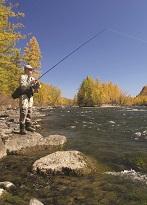

The Ideal Event
Unique among most sports, fishing events require that planners manage logistics, participants, weather and budgets, but they also have to plan for variations in nature: they have to know where to find the fish.
Jason Falk is the owner of “Fishing with J,” a fly fishing guide service in Jackson Hole, Wyoming, and a second-generation Snake River fly fisherman.
“One of the most important things for a fly fishing event is having guides who are familiar with the rivers and the hatch, someone who can match flies to the bugs coming off,” says Falk. “For larger events, you also have to choose a location with multiple rivers.”

Don Gasaway, a Midwest-based writer, editor and hunting/fishing expert, agrees that support is key to fishing tournaments.
“If I were planning a tournament, my first consideration would be the availability of local support. This would be either financial or in-kind,” says Gasaway. “Labor is usually available with local fishing clubs and/or the state conservation department. Be prepared to put in a lot of time and effort. 90% of the work will be done by 10% of the people involved.”
But most importantly, says Stephen A. Bortone, Ph.D., executive director of the Gulf of Mexico Fishery Management Council, fishing event planners must plan ahead.
“Quotas are set by federal law, and once a fishery reaches that quota, the fishing has to stop, even if there are tournaments scheduled,” says Bortone. “We’re trying to rebuild the fishery to where it was decades ago, and the unfortunate truth is that rebuilding takes time. It takes a red snapper 35 years to reach full growth, for example. The fish are getting bigger – seven pounds as opposed to an average of three pounds several years back - and that’s progress, but it also means that the red snapper season gets shorter. You reach your poundage quota a lot faster when the fish are bigger.”

It might be the complexities of fishing and fishing tournaments that make these events so popular. Anglers are part of a community, and fishing events are a kind of homecoming. Fortunately, there are ample destinations ready to call these tournaments home: an inspiring catch and stunning scenery abound from coast to coast. Whatever the requirements for your next event, the ideal destination is just a few casts away.
Williamson County, Illinois
In Southern Illinois, a nearly 7,000-acre lake, rich with largemouth bass, crappie, bluegill and channel catfish attracts anglers from all over America. Located in the Crab Orchard National Wildlife Refuge, the Crab Orchard Lake fishery is managed in partnership by the Illinois Department of Natural Resources and U.S. Fish and Wildlife Service. Crab Orchard offers up a generous amount of three- and four-pound bass, and each year, a few 10-pounders make an appearance as well. This reputation for big bass has made Crab Orchard a fishing favorite throughout the Midwest and drawn a number of high profile events.
At 8.5 miles in length, Crab Orchard is the largest lake in Williamson County, and it is the centerpiece of one of Illinois’ most renowned fishing communities.
“In 2011, Williamson County brought in $117.33 million in tourism expenditures, and we’ve held the top spot in the southern Illinois region for two years now. A lot of that has to do with our outstanding outdoor recreation, including hunting and fishing,” says Shannon Johnson, executive director, Williamson County Tourism Bureau.

• Lake of Egypt, owned by the Southern Illinois Power Cooperative, a 2,300-acre lake known for an outstanding bass population.
• Devils Kitchen Lake and Little Grassy Lake, both located within the Crab Orchard National Wildlife Refuge, both known for high-quality fishing. Devils Kitchen Lake is sought after for its rainbow trout and Little Grassy Lake, which is shallower, earns big devotion for its catfish population. Both lakes are known to produce fish of impressive size.
Halifax County, Virginia
In 1733, when Colonel William Byrd surveyed and mapped the region, he was so enamored with the southern part of Halifax County that he remarked, “The River Dan flows through the land of Eden.”
The Dan River, arguably the area’s most popular fishing river, continues to elicit admiration from anglers all over.
“We’re actually surrounded by four rivers, and fishing is a big deal here. Some places have golf tournaments to raise money. Here, we have fishing tournaments,” says Linda Shepperd, director of tourism, Halifax County.
One of the focal points of Halifax County’s fishing culture is the 58,000-acre J. H. Kerr Reservoir, popularly known as Buggs Island Lake, home of flathead and blue catfish, walleye, white perch and white bass. The striped bass run keeps anglers busy in April and May and the hardiest of fishing is done for walleyes throughout the winter.

Ironically in the world of fishing, the rumors aren’t so far off. In March 2011, a 111-pound catfish emerged from Buggs Island Lake. The fisherman called the game warden and together they got the fish into a live box. That fish continues to thrill sportsmen from its home in a giant aquarium at the Richmond Bass Pro Shop.
That catfish set the state record, but it was a short-lived fame: just six weeks later a 29-year old local pulled a 143-pound blue catfish from the same waters. The catch set the world record and set the imaginations of anglers everywhere spinning.
Eau Claire, Wisconsin
Walleye is king in the upper Midwest, and Eau Claire is its Wisconsin kingdom. Host of the 2009 FLW Walleye League Championship Tournament, Eau Claire welcomed the pinnacle of walleye fishing, the culmination of a 12-tournament qualifying series that runs April-August. It is held on Lake Wissota, a 6,000-plus acre lake with populations of walleye, muskie, bass, panfish, northern, catfish and sturgeon, as well as a popular ice fishing season.
Lake Wissota is just one of Wisconsin’s glittering gateways to fishing glory; the state offers more lakes than its 10,000-lake neighbor Minnesota. But while its fish and its waterways are famous, Eau Claire also offers something even more coveted.

Most recently, Eau Claire welcomed the FLW Walleye Week Championship, partnering with the local rod and gun club launch. “The club is a really great partner, and we always look for that, someone that can provide manpower and expertise. We were able to rely on them for any information we needed: hotspots on the lake, best parking practices for boats and trailers and so on,” says Strubel.
The event attracted 95 boats, and created an estimated $150,000 economic impact for the area. That’s just a day on the lake for Eau Claire, which also hosted, in 2005, the ESPN Elite 50 tournament, a two-day event, that attracted more than 14,000 fans just to watch the weigh-ins.
“Our local folks really turn out,” says Strubel, “The heroes of the world of fishing are celebrities here. Everyone was just so excited.”
Eau Claire’s largest tournament to date was the Fishers of Men Midwest Regional Tournament. “There’s just nothing like seeing over a hundred boats out on the quiet water at 5:30 a.m., just as the sun beings to rise,” says Strubel. “Nothing like it.”
Lake Lanier, Georgia
With its proximity to the Atlanta metro area and its nationally known sport fishery, Lake Lanier is a 38,000-acre fishing destination with both the resources and experience to host legendary fishing tournaments. In 2010, Lake Lanier hosted the FLW Outdoors Forrest Wood Cup also known as the World Championship of Bass Fishing and, citing the lake’s size, facilities, ease of access and, of course, Southern Hospitality, the event returned again in 2012.

Many consider the Forrest Wood Cup the national championship of bass fishing, and the 2012 event consisted of 46 pros and 46 co-anglers who qualified through six different tournament circuits over the past two seasons. Lake Lanier makes an appealing venue for this event for a number of reasons.
“We have all of the resources of the Lake Lanier Resort, as well as nearby hotels in Alpharetta and the communities to the north. Whatever your budget, we have plenty of options for lodging, attractions and dining,” says Dickson. “Also, particularly for bass, we are one of the most coveted fisheries in the country, with at least 10 guide companies that do fishing, including one run by Shane Watson, inducted in January 2010 into the Freshwater Fishing Hall of Fame as a Legendary Guide.”
Part of the Georgia Sports collaborative, the Lake Lanier Convention and Visitors Bureau serves as a liaison between events and the Lake Lanier community, helping create partnerships and finding the perfect facilities to cater to any size tournament.
The CVB also assists in tournament scheduling. While Lake Lanier fishing tournaments can be held year-round, the best fishing seasons are spring (March-May) and fall (September-December). Largemouth, spotted and striped bass and crappie are popular sport fish species for resident and visiting anglers. Bream, walleye and channel catfish are also popular sport fish. The CVB has created a new smartphone app to help event organizers see, at a glance, what permitted events are happening around the lake.
Making it Memorable
Fishing tournaments require some special considerations. As Don Gasaway summarizes, “The destination should have ample accommodations available for the non-resident anglers, good local restaurants and sight-seeing for the families of contenders. But also, the water should offer a good fishing location and not be subject to weather and water level problems or clarity.”
But most often, the success of an event is very similar to every other kind of sport: make it memorable, and people will come back. Take advantage of one of America’s many unforgettable fishing destinations, and you’re casting with great bait.

